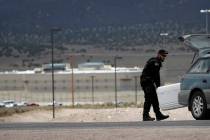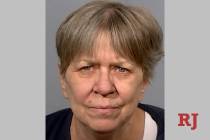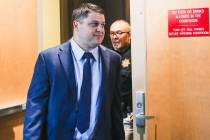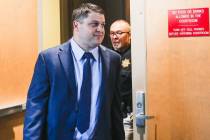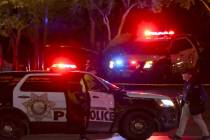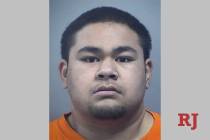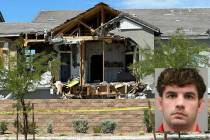Rise in deaths keeps Clark County coroner’s office busy
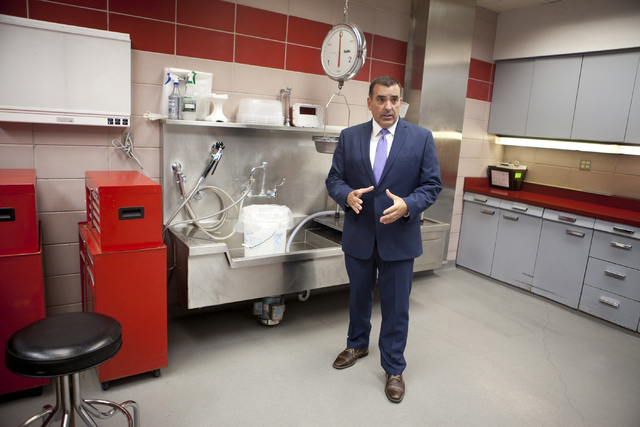
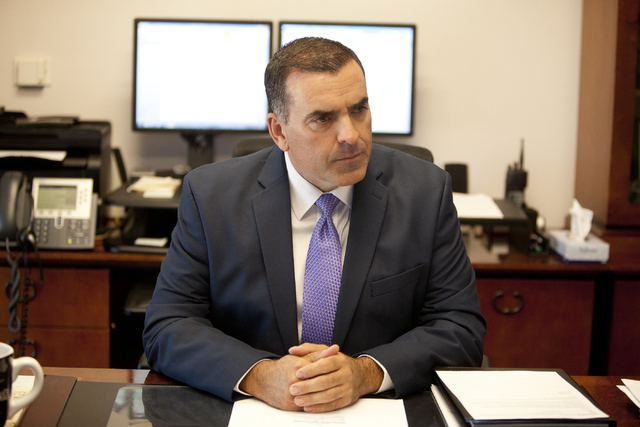
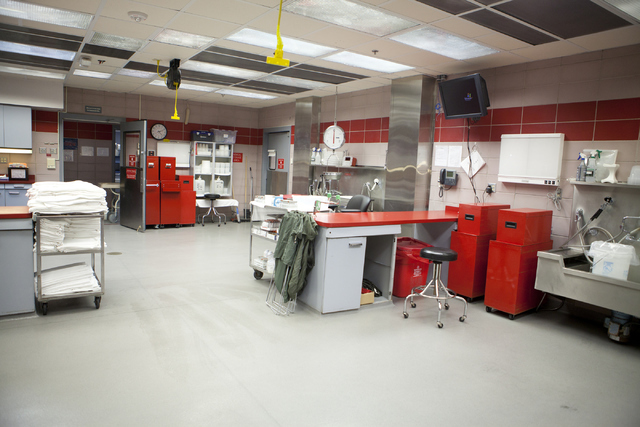
On a hot afternoon in July, the Clark County coroner pulled open a large metal door at the back of a garage, allowing a pungent odor to float from a frigid back room.
A visitor, unaccustomed to the smell, found it difficult to breathe through her nose.
Five bodies in plastic bags, one the size of an infant, lay motionless on metal tables, waiting to be picked up by mortuaries. One of the larger bags revealed pale feet with sparkly, painted toenails.
Clark County Coroner John Fudenberg said funeral homes collect, on average, a dozen bodies from his Pinto Lane office each day.
“We’re extremely busy,” he said, “probably busier than we’ve been in over a decade.”
A big reason for that: The number of homicides in the first half of 2016 is up 54 percent from the same period last year.
Medical examiners at the coroner’s office investigated 109 homicides between Jan. 1 and June 30, compared with 71 homicides during the same period last year.
Last year’s total homicide count, 187, was the highest since 2006, when the office investigated 201 deaths. The county saw a decrease in homicides between 2006 and 2009 — about 26 percent — followed by a steady increase from 2011 to present.
And it’s not just homicides that have gone up; all deaths have.
Homicides made up only about 1.4 percent of the 12,985 total deaths reported to the coroner’s office in 2015. Of those, the office investigated nearly 4,000.
Fudenberg’s office investigates all deaths by violence, criminal means and suicide, as well as any unattended deaths, regardless of cause. Bodies come to the coroner’s office from Las Vegas, North Las Vegas, Henderson, Boulder City, Mesquite and Laughlin. Occasionally, the office accepts cases from other counties.
“We’re projected to have more deaths this year in Clark County than we’ve ever had,” the coroner said. He believes the increase in overall deaths could be a result of the valley’s increasing population and a rebound in the economy.
To keep up with the death toll spike, the coroner staffs five full-time forensic pathologists, or medical examiners, and is working to recruit a sixth. He also has 10 part-time forensic pathologists who help lighten the doctors’ caseloads.
Fudenberg’s office normally takes 6 to 8 weeks to examine a body and determine a cause and manner of death.
“We work very hard to keep the turnaround time down,” he said. “If you look at all the agencies in the country, we are very efficient compared to most.”
Fudenberg said homicides can be some of the easier investigations, compared with deaths in which the cause isn’t as apparent as, say, a gunshot wound to the chest. Medical examiners often can determine the cause of death in a homicide in 24 hours.
“But they also can take a lot longer to deal with in the long term, because our doctors are going to have to testify in numerous court proceedings,” Fudenberg said. “We may have to have meetings with law enforcement to share our findings with them, so they can be time-consuming after the initial investigation.”
While the coroner’s office works closely with area police departments during homicide investigations, Fudenberg said there’s no pressure to prioritize homicides over other cases.
“What people don’t often understand is although we work with them, we don’t work for them, and there’s a very clear line of independence,” he said.

Medicolegal death investigators — the employees who respond to the location of a body, work with police and monitor homicide cases as they progress — also are responsible for notifying families that a relative has died.
“Notifying the next of kin that their loved one just died in a tragic, unexpected incident is very emotionally taxing,” Fudenberg said. “Although most of our staff will tell you doing death notifications is quite possibly the most difficult part of their job, it’s also the most rewarding part of their job because they’re able to help that family through one of the most difficult times of their lives.”
The worst cases for Fudenberg and his staff are the ones that remind them of someone they know, he said.
“It depends on the situation and where we are individually at that time, but I think as far as a consistent difficult case to handle I would say it’s typically the children that die unexpectedly and tragically,” Fudenberg said.
He recalled several deaths in which the victim reminded him of his daughter.
“Somebody told me this very early on in my career here, that we see every day what 90 percent of the population will never see in their entire life,” Fudenberg said. “To think that that’s not emotionally taxing is absolutely ridiculous.”
The coroner’s office has an employee wellness program and two volunteer chaplains who exclusively serve staff. Employees have potlucks and barbecues and attend baseball games together to alleviate workplace stress.
“We horse around plenty with each other, but when it comes to the decedents and their family, we take that very seriously,” he said.
A sign hangs over every door leading from the building’s offices to the exam room to remind workers that each body they examine is somebody’s loved one:
“Remember … Families entrust us with one of their most precious possessions. Keep faith with them by conducting yourself as though the family were present. The body is dear to them … treat it reverently.”
Contact Kimber Laux at klaux@reviewjournal.com or 702-383-0283. Follow @lauxkimber on Twitter.
RELATED
Young people with guns contribute to Las Vegas Valley’s rising homicide rate
Rise in Las Vegas Valley homicides means police solving fewer cases









